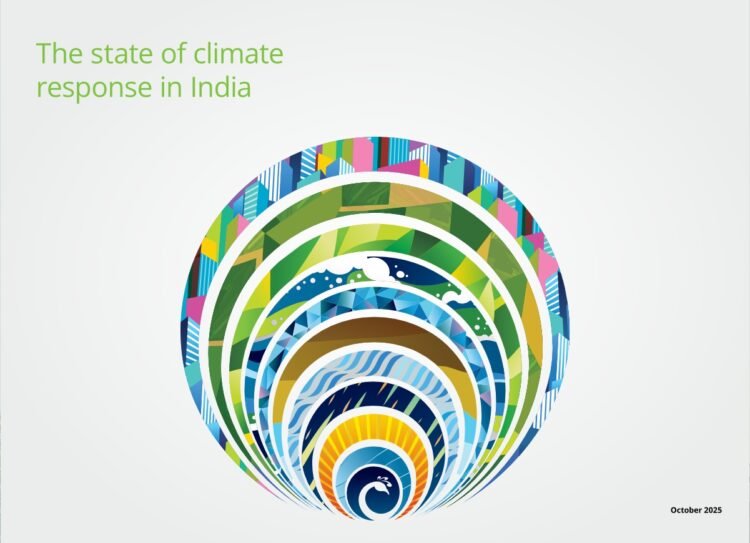India’s climate response must evolve from scattered initiatives to a shared mission that rewires how we build, invest and innovate.
NEW DELHI (India CSR): According to the latest report released by Deloitte India in association with the Rainmatter Foundation, titled, The state of climate response in India,by investing in climate action, India can add upwards of 5 million jobs to its economy by 2030. Per earlier analysis conducted by Deloitte, delivering on this vision would require an estimated US$1.5 trillion towards climate change within the same time frame.
This investment would significantly contribute towards creating direct and indirect jobs in manufacturing, operations and maintenance, green materials, feedstock aggregation, warehousing and logistics. It could lead to an estimated US$3.5 to 4 trillion in yearly economic output, advancing India’s transition towards a more inclusive and climate-resilient economy.
According to the report, shifts in rainfall, temperature, land use and biodiversity loss are weakening natural buffers and increasing the cost and complexity of adaptation. It also states how addressing India’s climate challenge requires a systemic transformation. It advises policymakers, corporates, civil society groups and city planners to move beyond siloed interventions, adopting a systems approach to assess risks and design integrated responses.

“India’s climate response must evolve from scattered initiatives to a shared mission that rewires how we build, invest and innovate. This is not about doing more projects. it’s about redesigning the core and making resilience the default setting for growth. Boardrooms, governments and communities need to work together on a single ‘systems agenda’ where adaptation and mitigation reinforce each other, resulting in cleaner air and cooler cities, reliable water and resilient livelihoods, competitive industries and future-ready jobs. The opportunity now is to turn intent into infrastructure with policies that de-risk capital, data that guides action, and talent that scales solutions, all of which hopefully setting the ‘sustainability flywheel’ in motion, which then compounds across decades,” said Ashwin Jacob, Partner and Energy, Resources & Industrials Industry Leader, Deloitte India.

“Unlocking the promise of green job creation rests on the ability to move beyond fragmented climate efforts and work in unison. When policymakers, corporates and civil society groups channel their investments and innovations into a shared vision for climate action, the benefits ripple far beyond economic opportunity, strengthening community resilience and fostering new livelihoods. The path forward lies in building alliances, mainstreaming sustainability into business strategies and daily choices and nurturing a culture where every action counts,” said Prashanth Nutula, Partner, Deloitte India.
As part of this report, Deloitte conducted the 2025 Citizen Climate Survey, which reveals that climate change increasingly affects daily life in India. While 86 percent report tangible effects, one-third face significant disruptions to health and livelihoods. Many individuals are beginning to adapt, with 44 percent practising waste segregation, 40 percent reducing electricity or water use and 30 percent cutting down on single-use plastics.
Despite this, a lack of coordinated efforts and collective action limits participation, with about 22 percent being inactive. This is constrained by doubts about individual impact (33 percent), the perceived need for financial incentives (30 percent) and limited awareness (25 percent).

Additionally, Deloitte conducted the Corporate Climate Readiness Survey 2025 as part of this report. According to the survey, Indian businesses are facing challenges due to climate-related events, with 47 percent citing employee health challenges driven by changing environmental conditions and nearly 44 percent reporting changing consumption patterns and regulations affecting operations. Businesses are taking active steps in addressing climate change, with almost 41 percent of respondents building climate risk mitigation and adaptation capabilities and 28 percent supporting innovation to drive new climate solutions.
However, corporate climate efforts are hindered by isolated interventions, limiting collective impact and sector-wide alignment.
“The challenges we face today are deeply interconnected, but that also means the solutions can be transformative. Our report shows that by embracing complexity and overcoming silos, businesses and governments can unlock new opportunities for resilience and innovation. Those who lead this shift will not just adapt, they will define the future,” said Sameer Shisodia, CEO, Rainmatter Foundation.

As per the report, climate indicators are deeply linked, creating cascading risks across the atmosphere, hydrosphere and lithosphere. The report suggests shifting from point solutions to a systemic transformation to align multiple climate efforts better. This means mainstreaming climate into boardroom priorities, core strategy and value chains in a way that decisions, investments and incentives pull in the same direction Investing in climate focused open interoperable systems can connect stakeholders across sectors, such as energy, agriculture, waste and water systems, enabling transparent, verifiable and efficient exchanges of data, services and resources, while unlocking innovation at scale.

It also calls for developing climate talent through education, entrepreneurship and upskilling aligned with jobs in renewable energy, resilient infrastructure, sustainable agriculture and circularity. Additionally, the report suggests that establishing unified climate governance across national–state–local levels, strengthening research–policy–industry linkages, investing in reliable climate data and clear public communication will enable evidence-based action and broad participation.
Terms & Conditions: India CSR does not permit other Websites/agencies to copy or reproduce, or reprint the above article/feature in any form or means.






















